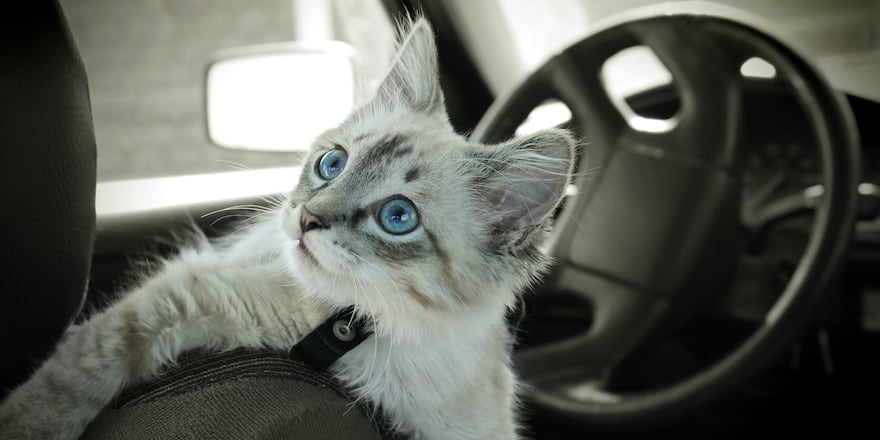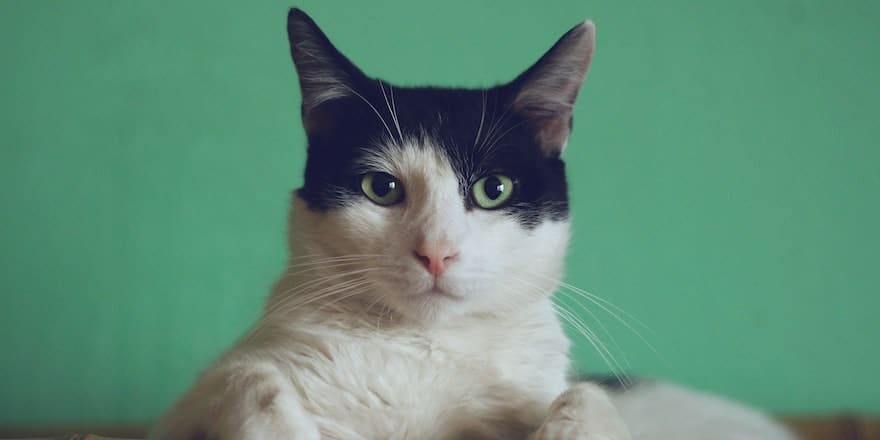Vomiting is the expulsion of stomach contents through the mouth. In cats, it is particularly frequent and easy. It can be accompanied by sometimes impressive abdominal contractions!
A cat can vomit for many reasons, from the simple regurgitation of hairballs to much more serious causes like an intestinal obstruction, chronic kidney failure, or even lymphoma.
Determining the cause of a cat’s vomiting requires a veterinary consultation, often along with additional tests such as a blood test, an X-ray, or an abdominal ultrasound.
Read also | What are the best wet foods for cats?
What should I do if my cat vomits occasionally?
Occasional vomiting is common in cats. Most of the time, it is not serious.
This does not mean they should not be treated because, over time, they can cause inflammation of the digestive tract.
My cat vomits undigested kibble
The regurgitation of undigested food is a classic case of feline vomiting; it is not uncommon for the charming kitty to even want to re-eat its vomit immediately!
These vomits are usually a result of gluttonous animals that eat their meals too quickly.
To avoid this inconvenience, one can divide the daily amount of kibble into several small meals.
Ideally, you can even spread them in several bowls in different locations around the apartment or house. This replicates the cat’s natural nibbling/hunting behavior.
Moreover, there are special anti-glutton bowls on the market that help slow down food intake. They have an entertaining aspect that appeals to small felines.
My cat vomits hair
Second classic case! The cat is a clean animal that grooms itself a lot. By licking itself, it absorbs many hairs that irritate the stomach and can sometimes form compact masses.
These hairball vomits are more frequent in long-haired cats.
This symptom should not be taken lightly as it causes chronic inflammation of the digestive tract.
In the most severe cases, hairballs can cause intestinal obstruction requiring surgery.
To solve the problem, you should:
- Brush the cat regularly to remove as much dead hair as possible
- Regularly give it lubricants to eliminate hair in the stool (available from veterinarians)
- Optionally, offer it special kibble known as hairball prevention (Hairball).
My cat vomits its catnip
Cats love catnip, but the feeling isn’t always mutual!
Ingesting these herbs can indeed cause stomach irritation and vomiting. If you find these plants in your cat’s vomit, it’s best to stop playing gardener.
My cat vomits white or yellow foam
White or yellow vomiting occurs when animals vomit on an empty stomach, or have nothing left to vomit.
This is gastric or duodenal juice, possibly mixed with gas that gives it a foamy appearance.
My cat vomits water
A vomiting cat may regurgitate even the slightest drop of water swallowed. It is important to put it on a fast.
My cat vomits blood
Blood traces in a cat’s vomit can simply be a sign of stomach irritation.
In the case of a large blood puddle, more serious causes like anticoagulant poisoning or a tumor may be the cause. A veterinary consultation is essential.
My cat vomits worms
Some worms like roundworms can be present in vomits. They are common in kittens and resemble white spaghetti.
If your cat vomits worms, you will need to administer a dewormer, then repeat 15 days later.
Reminder: kittens should be dewormed once a month until they are 6 months old.
My cat vomits in the car
Many cats are not very fond of car trips. It’s sometimes difficult to distinguish between stress and motion sickness in this species.
Stress manifests with symptoms like heart-rending meows and diarrhea. And motion sickness does too… often with nausea and vomiting as well.
If vomiting occurs, you can ask your veterinarian for a tablet to give half an hour before departure.
Read also | Our guide to the best cat kibble

What should I do if my cat vomits multiple times a day?
My cat is vomiting and has diarrhea
Acute vomiting and diarrhea can be a sign of gastroenteritis of food, bacterial or viral origin.
You can put your kitty on a 24-hour fast, but if symptoms persist or if your cat is very young, old, or frail, or seems unusually lethargic, consult a veterinarian without delay.
Treatment involves antispasmodics, digestive protectants, and sometimes antibiotics.
In severe cases of gastroenteritis, hospitalization may be necessary especially for kittens due to the risk of dehydration.
Typhus (or feline panleukopenia) is a very severe viral gastroenteritis in cats. It can be prevented by vaccination from the age of 2 months.
Sudden vomiting can also indicate a liver condition (cholangiohepatitis, steatosis), which is common in cats. A blood test usually detects it.
My cat swallowed a foreign object
This issue is more common in young cats. Cats can swallow many objects, either intentionally or accidentally (for example, during play): small toys, strings, earplugs, etc.
If the object gets stuck in the intestine, it can cause a blockage resulting in acute vomiting, loss of appetite, lethargy, and sometimes abdominal pain.
The diagnosis is made by the veterinarian based on clinical examination, X-ray, or ultrasound.
Treatment is surgical and must be carried out without delay.

What should I do if my cat vomits often?
Vomiting that occurs regularly for several weeks could indicate a chronic condition and may involve various complications.
Chronic kidney failure in cats
It arises in middle-aged to older animals. It is often linked to kidney tissue disease, but sometimes also to kidney stones.
Typical symptoms include vomiting, weight loss, reduced appetite, and polyuria-polydipsia (increased drinking and urination).
The diagnosis is based on a blood and urine test and/or a kidney ultrasound.
A digestive lymphoma in cats
Lymphoma is a cancerous tumor that develops in the wall of the digestive tract. It can affect the stomach, intestines, and lymph nodes and can appear as a diffuse or localized mass.
Aside from vomiting, affected animals often show a decrease in appetite, weight loss, and diarrhea.
Oral chemotherapy often yields good results in managing this feline cancer.
A chronic inflammatory disease in cats (IBD)
IBD presents similarities with lymphoma, from which it is not always easy to differentiate. However, IBD is a non-cancerous inflammatory condition.
Treatment involves corticosteroids.
In case of chronic vomiting, it is essential to consult a veterinarian who alone can make the diagnosis and offer the best treatment for your little companion.
Should you adapt the diet of a vomiting cat?
Certain conditions may require a diet change.
For example, a cat that often vomits hairballs may be offered special kibbles (Hairball care or Hairball control): richer in fiber, they facilitate the natural elimination of hair in the stools.
A cat suffering from kidney failure should receive a diet with high-quality proteins to reduce the formation of toxic waste.
These special kibbles or pates help extend the lives of affected cats and alleviate the symptoms of the disease.
For IBD, hyperdigestible and/or hypoallergenic kibbles are recommended.
A cat that occasionally vomits is not necessarily sick. However, if it recurs, or if its health seems to deteriorate, do not hesitate to consult your veterinarian.



